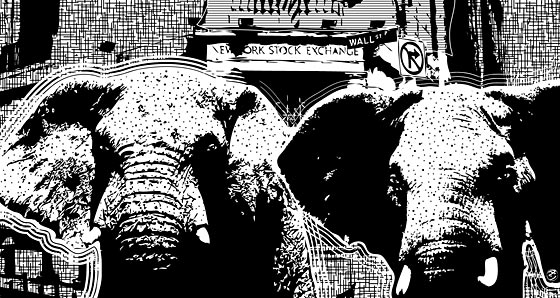
Until last week, the odds seemed decent that the legislation to reform the rules governing the nation’s financial system was on a glide path to a swift and relatively painless passage—with, glory be, a goodly number of Republicans along for the ride. But then Mitch McConnell and other GOP leaders leaped out of the bushes and threw their bodies on the track, inveighing against the effort to rein in Wall Street in terms more harsh and strident than we’d heard from them since … oh, a month ago. The (depressing, horrifying) parallel was impossible to ignore: Financial reform was rapidly morphing into health care all over again.
There are a number of plausible explanations for the sudden shift of tone and tactics by Republicans. But the prevailing theory among Democrats revolves around one man. In January, the GOP pollster and message maven Frank Luntz penned a seventeen-page memo titled “The Language of Financial Reform,” in which he wrote, “The single best way to kill any legislation is to link it to the Big Bank Bailout.” Luntz went on to lay out a strategy whereby Republicans should describe a measure that makes Wall Street foot the bill for future rescues as foisting the cost on taxpayers, and one designed to make such rescues less likely as perpetuating them ad infinitum. Which is to say: a strategy centered on deploying a vocabulary so doublespeaky it would have made George Orwell blush.
It wasn’t hard to hear the echo of Luntz’s advice in McConnell’s rhetoric, as when the Senate minority leader declared, “This bill not only allows for taxpayer-funded bailouts of Wall Street banks, it institutionalizes them.” So deafening was that echo, in fact, that Chris Dodd, the principal author of the reform legislation, took the unusual step of placing the pollster’s entire memo into the Congressional Record.
In the wake of Dodd’s blowup, McConnell aide Don Stewart disclaimed the level of influence imputed to the wordsmith by Democrats. “I’m not sure what their fascination is with this Luntz fellow,” Stewart told Politico’s Mike Allen. And Luntz himself said something similar: “I don’t see that I have that much of an impact.”
Whether Luntz had actually been struck blind or was simply being modest—both as improbable as my dog standing up on his hind legs and mixing a martini—he and Stewart doth protest too much. Since 1994, when Luntz had a central role in the drafting of the Contract With America, the pollster’s influence on the framing of Republican talking points can hardly be overstated. It was Luntz who ingeniously, and diabolically, helped the GOP to brand the estate tax the “death tax”; advised the party to dub offshore oil drilling “deep-sea energy exploration”; argued that school vouchers should be called “opportunity scholarships”; and counseled the Bush administration to speak of the “lack of scientific certainty” about global warming.
More recently, and even more pertinently, Luntz drafted a memo that provided the linguistic template Republicans employed to attack the Democratic health-care reform initiative. You might wonder why Republicans would again be adopting Luntz’s lexicon given that on health care they, you know, lost. But the GOP doesn’t see it that way, and they may have a point. Despite the passage of the historic bill, the public remains deeply divided on its wisdom, and there is every chance that the GOP will be able to gain this fall by running against Obamacare.
But judging by virtually all the available evidence—and certainly by the polls that the White House is consulting every fifteen minutes—financial reform is a very different kettle of fish than health care. Across the ideological spectrum, the desire to see Washington crack down on Wall Street is intense, and only likely to grow more so in light of the SEC’s decision to bring a civil fraud case against Goldman Sachs. The Democratic pollster Geoff Garin tells me that no issue apart from jobs resonates right now more deeply. “Unlike with health care, there is no part of the electorate that doesn’t want to see action,” he says, and then adds a data point that’s crucial: No matter how the issue is framed, voters perceive opposition to reform as a sign of being in the bankers’ pockets.
The question for Republicans, then, is whether they will listen to Luntz or to the people who elected them. Democrats can only hope that the party stays true to form.
Have good intel? Send tips to [email protected].
E-mail: [email protected].